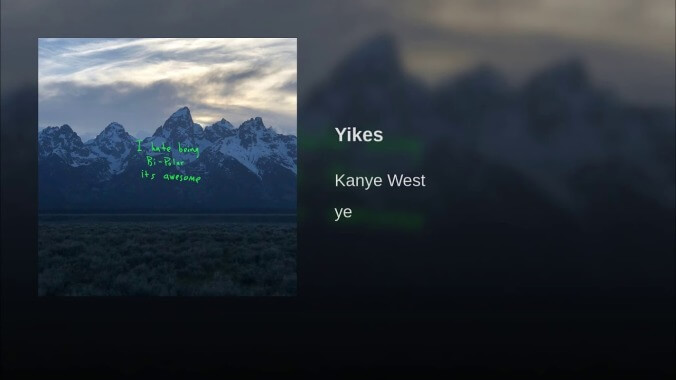Ye won’t change your mind on Kanye

In a way, Ye is what everyone wanted. The word “Trump” appears nowhere on the album. Kanye only acknowledges his risible claim that “slavery was a choice” obliquely, and with regrets (“I ain’t finna talk about it another four centuries”). He doesn’t attempt to fit the hateful rhetoric of his YouTube thought leaders in with the progressivism of his earlier work, as he did on the unintelligible “Ye Vs. The People.” He never says “poopity scoop.” People turned off by the messy, in-media-res excess of The Life Of Pablo will find it his most concise record. If you missed the old Kanye, well, he’s here, bringing plump, stirring soul samples—and if you missed the new Kanye, there’s plenty of abrasive, Yeezus-style abstraction, too. Ye, as always, contains multitudes. The album strives only to reflect this, from its cover art—which proclaims “I hate being bi-polar, it’s awesome”—to the journey conveyed across its slim runtime, from utter darkness to something like a new day dawning.
Part of what made Pusha-T’s Daytona so bracing was Kanye’s editing, which looked contemptibly upon intros, outros, hooks, and interludes; it was all Pusha, one of the world’s fiercest emcees, unleashed. But Kanye’s no Pusha, and his verses here range from detestable to fine. The album begins with a several-minute monologue about killing an unnamed other—it’s hard to imagine he’s talking about anyone besides his wife, given how much of the album focuses on her, but remember that the album cover was originally the plastic surgeon whose work led to his mother’s death—and he goes into squealing, self-satisfied mania over the bleating MDMA pulse of “Yikes.” “Just say it out loud, just to see how it feels,” he convinces himself, and then he does, imagining his own death, praying for Russell Simmons (“He got #MeToo’d”), and shouting out Kim Jong-un. This is some of the ugliest music of his career, but it’s followed by a hollowed-out calm; “All Mine” and “Wouldn’t Leave” are minimal collages of organ drones, a rotating cast of sinuous hook-men, and what are apparently the best jokes about ejaculate and breast implants Kanye came up with in the past couple years. (Your mileage will vary here, entertainment-wise.) There’s a faint echo of chipmunk soul in the latter of these, which almost sounds like a baby crying in the next room, and in the album’s final trio of tracks, Kanye exits the nightmarish nihilism of the record’s earliest moments and sheepishly looks his wife—and his daughters—in the eye.
Of course, this takes the form of a surprisingly detailed verse about his daughters’ bodies and eventual sexual proclivities. But it’s accompanied by joyous Slick Rick samples, sunburst Charlie Wilson hooks, a transportive Dej Loaf hook, and “Ghost Town,” a staggeringly dense sound collage that sounds like a wide-open Wyoming night sky coming alive with dreamy laser blasts. Its beauty holds up the entire album. Kanye can’t convey his obsessions—drugs, death, sex, fame—with the eloquence of, say, Danny Brown. But he can still create thunderous blasts of sound on par with anyone on the planet, and Ye’s best moments are reminders of that. It’s a prismatic album, reflecting its creator’s entire body of work—and also whatever you think about him going in.
If you’re inclined to forgive Kanye, you will, when he self-consciously reassures you, “I’m just being silly,” on the album’s last track. If you revile him, you will, when he megalomaniacally ponders murder on the album intro. These bookends are meant to contrast, to draw out each side, then find some bridge between them in the music. Previous Kanye records did this in a single track, providing irresistible rejoinders to the public’s perception of him; no one fought against the unifying power of “Power” or “Stronger” or “Gold Digger,” they were just swept along by them. Ye’s no longer interested in getting both sides to meet quite so neatly, and neither is Ye. You’ll hate this album, it’s awesome.